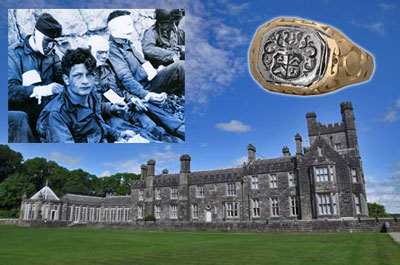
I heard him catch his breath, and his eyes darted straight towards mine. His bottom lip fell open slightly, taking in what I had said. A cascade of thoughts must have flooded his brain.
“What message?” he breathed.
“I was the nurse looking after him at Dover. He made me promise to give you this.” I opened my hand and held out the ring.
Carrington spluttered a cough, although I think he was covering up a cry. He didn’t rush to look at the ring. He must have already known the object: seen it, touched it, held it. He sat for a while, and then came over and took it, tucking it away in a pocket. Then he limped over to the terrace window, looking over the gardens and hills, so alien in this wartime struggle: a manicured façade coating the reality of brute terror.
“It’s mine, you know.” he said quietly. “The ring.” He turned to me. “I gave it to him. Two years ago. We were at boarding school together.” He became self-conscious and examined his hands. “What did he say?”
“He told me to tell you he loved you.” I shuddered silently. “He was so terribly weak, and—” My words faded out.
His eyes looked tormented, broken, as he struggled to regain his countenance. He looked out of the window, away onto the horizon, tears welling unstoppably. A few dreadful minutes passed. I suddenly panicked that maybe he hadn’t already known about Jarroby’s death. Had I unconsciously broken the worst news he could ever want to hear?
“I’m sorry,” I stammered. “I thought you knew he was dead. I thought, well, I didn’t know what to think.”
“I did know,” he mumbled, clearing his throat. “His mother telephoned. She knew we were friends, although she never knew —” He cut off, frowning inscrutably. “I don’t mind if you hand me in, you know,” he said, a stern pride controlling his tears. “You can do your worst. I don’t care. I have nothing left to hide.” He turned pensively to the drifting clouds and added in a rather dreamy way, “I have nothing left at all.”
“I’m not going to hand you in,” I said as gently as I could. “I made a promise to him.” I paused, thinking this was all far stranger than I had imagined. “You can trust me.”
He came and sat down on the sofa opposite me. “What happened?”
“He kept talking about you — how you’d be lost without each other, that he was the lucky one for dying first — and then he rolled over, his breath slowing until it finally slowed,” my words were fizzling out, “to a stop.”
Carrington put his head down and wept into his large hands. I sat watching for a while, feeling like I was intruding, wondering if I should leave. And then I looked out onto the horizon myself and realized that loss is the same wherever you go: overwhelming, inexorable, deafening. How resilient human beings are that we can learn slowly to carry on when we are left all alone, left to fill the void as best we can.
Or disappear into it.
I went over and sat next to him and, after a minute or two, I put my arm around him, and he turned and wept silently into my shoulder. I wondered if I was the only person who knew, the only shoulder he had.
The sound of a distant door opening and heavy footsteps in the hall announced the return of the Viscount, and Carrington stood quickly and limped over to the window, promptly composing himself and wiping his face with a white handkerchief.
“That’s my father,” he said without looking around. “He wouldn’t understand.”
“No, I imagine he wouldn’t.”
“Thank you for coming,” he added slowly, and I took this to be my cue to leave. He clearly didn’t want his father enquiring after my purpose for calling, after all.
As I stood and straightened myself, he turned and said, “Really, thank you, Mrs., er—”
“Mrs. Jennings.”
He smiled, and I caught a glimpse of a different man, a different world. “Mrs. Jennings,” he said. “May I visit you some time? I mean, if I survive this beastly war.”
I shrugged. “Of course you can. I live in Chilbury, Ivy Cottage.”
He opened the door for me, and we went into the magnificent hallway. A double staircase rolled up on both sides and came together in a type of royal balcony overlooking the expanse of parquet flooring. A clock ticked interminably, and I just wanted to get out, launch myself out of this oppressive place and into the fresh and wild outdoors.
The butler met my eye and gave a rather circumspect bow to young Carrington.
“I informed the Viscount that you had a visitor, and he requested to meet her,” he said pompously. “If you would be so kind as to wait here, madam, I will fetch him directly.” He bowed again in a condescending way, and strode off into the passage.
Excellent. I was to be confronted, whether I liked it or not. Carrington had gone rather pale. “I expect he just wants to see if you’re a young lady. Some romantic hopeful, if you catch my drift,” he said, attempting a smile.
“Yes,” I said wearily, hoping he was right.
He wasn’t. The Viscount stormed into the hall bellowing, “What’s all this, then?” He was a large man, in all senses of the word, with a full head of graying hair curling around his burgundy necktie. He looked both immaculate and furious, stalking up to me and declaring rudely. “Who, may I ask, are you? And what do you want with my son?”

